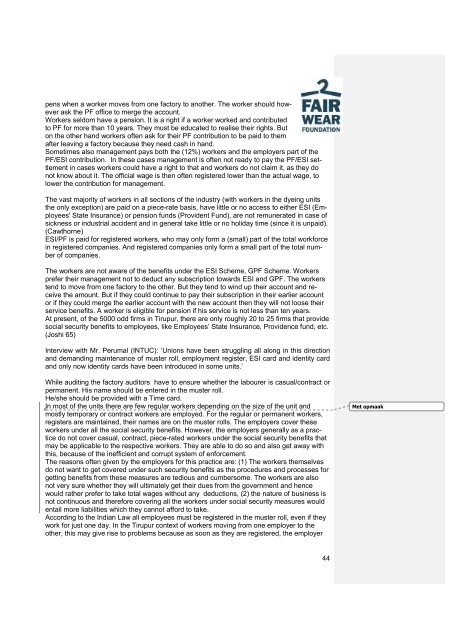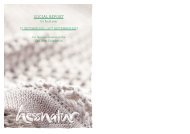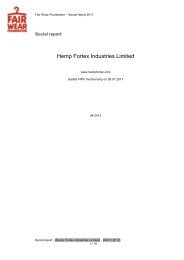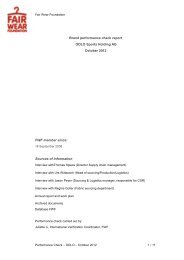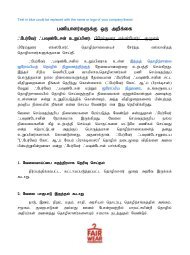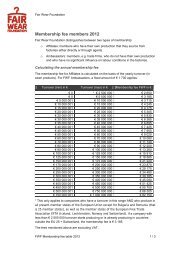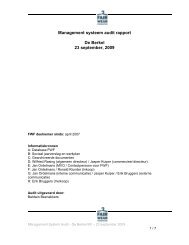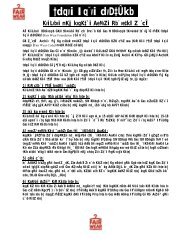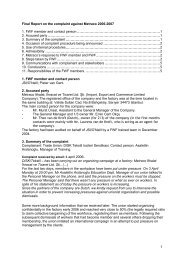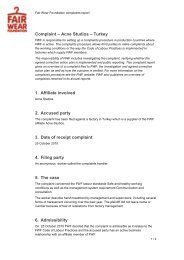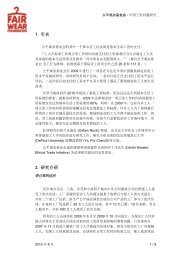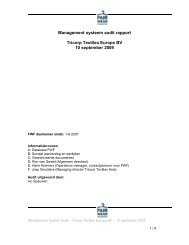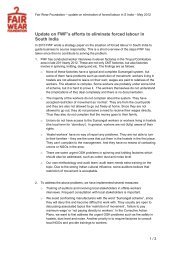Background Study Tirupur - Fair Wear Foundation
Background Study Tirupur - Fair Wear Foundation
Background Study Tirupur - Fair Wear Foundation
You also want an ePaper? Increase the reach of your titles
YUMPU automatically turns print PDFs into web optimized ePapers that Google loves.
pens when a worker moves from one factory to another. The worker should however<br />
ask the PF office to merge the account.<br />
Workers seldom have a pension. It is a right if a worker worked and contributed<br />
to PF for more than 10 years. They must be educated to realise their rights. But<br />
on the other hand workers often ask for their PF contribution to be paid to them<br />
after leaving a factory because they need cash in hand.<br />
Sometimes also management pays both the (12%) workers and the employers part of the<br />
PF/ESI contribution. In these cases management is often not ready to pay the PF/ESI settlement<br />
in cases workers could have a right to that and workers do not claim it, as they do<br />
not know about it. The official wage is then often registered lower than the actual wage, to<br />
lower the contribution for management.<br />
The vast majority of workers in all sections of the industry (with workers in the dyeing units<br />
the only exception) are paid on a piece-rate basis, have little or no access to either ESI (Employees'<br />
State Insurance) or pension funds (Provident Fund), are not remunerated in case of<br />
sickness or industrial accident and in general take little or no holiday time (since it is unpaid).<br />
(Cawthorne)<br />
ESI/PF is paid for registered workers, who may only form a (small) part of the total workforce<br />
in registered companies. And registered companies only form a small part of the total number<br />
of companies.<br />
The workers are not aware of the benefits under the ESI Scheme, GPF Scheme. Workers<br />
prefer their management not to deduct any subscription towards ESI and GPF. The workers<br />
tend to move from one factory to the other. But they tend to wind up their account and receive<br />
the amount. But if they could continue to pay their subscription in their earlier account<br />
or if they could merge the earlier account with the new account then they will not loose their<br />
service benefits. A worker is eligible for pension if his service is not less than ten years.<br />
At present, of the 5000 odd firms in <strong>Tirupur</strong>, there are only roughly 20 to 25 firms that provide<br />
social security benefits to employees, like Employees’ State Insurance, Providence fund, etc.<br />
(Joshi 65)<br />
Interview with Mr. Perumal (INTUC): ‘Unions have been struggling all along in this direction<br />
and demanding maintenance of muster roll, employment register, ESI card and identity card<br />
and only now identity cards have been introduced in some units.’<br />
While auditing the factory auditors have to ensure whether the labourer is casual/contract or<br />
permanent. His name should be entered in the muster roll.<br />
He/she should be provided with a Time card.<br />
In most of the units there are few regular workers depending on the size of the unit and<br />
mostly temporary or contract workers are employed. For the regular or permanent workers,<br />
registers are maintained, their names are on the muster rolls. The employers cover these<br />
workers under all the social security benefits. However, the employers generally as a practice<br />
do not cover casual, contract, piece-rated workers under the social security benefits that<br />
may be applicable to the respective workers. They are able to do so and also get away with<br />
this, because of the inefficient and corrupt system of enforcement.<br />
The reasons often given by the employers for this practice are: (1) The workers themselves<br />
do not want to get covered under such security benefits as the procedures and processes for<br />
getting benefits from these measures are tedious and cumbersome. The workers are also<br />
not very sure whether they will ultimately get their dues from the government and hence<br />
would rather prefer to take total wages without any deductions, (2) the nature of business is<br />
not continuous and therefore covering all the workers under social security measures would<br />
entail more liabilities which they cannot afford to take.<br />
According to the Indian Law all employees must be registered in the muster roll, even if they<br />
work for just one day. In the <strong>Tirupur</strong> context of workers moving from one employer to the<br />
other, this may give rise to problems because as soon as they are registered, the employer<br />
44<br />
Met opmaak


